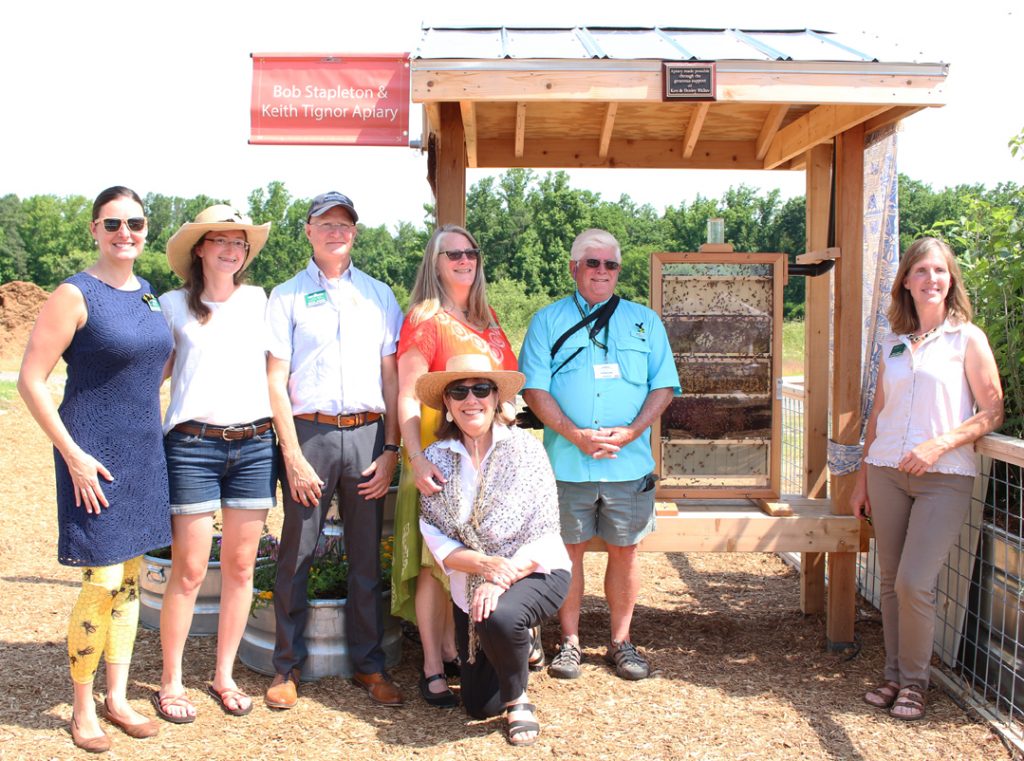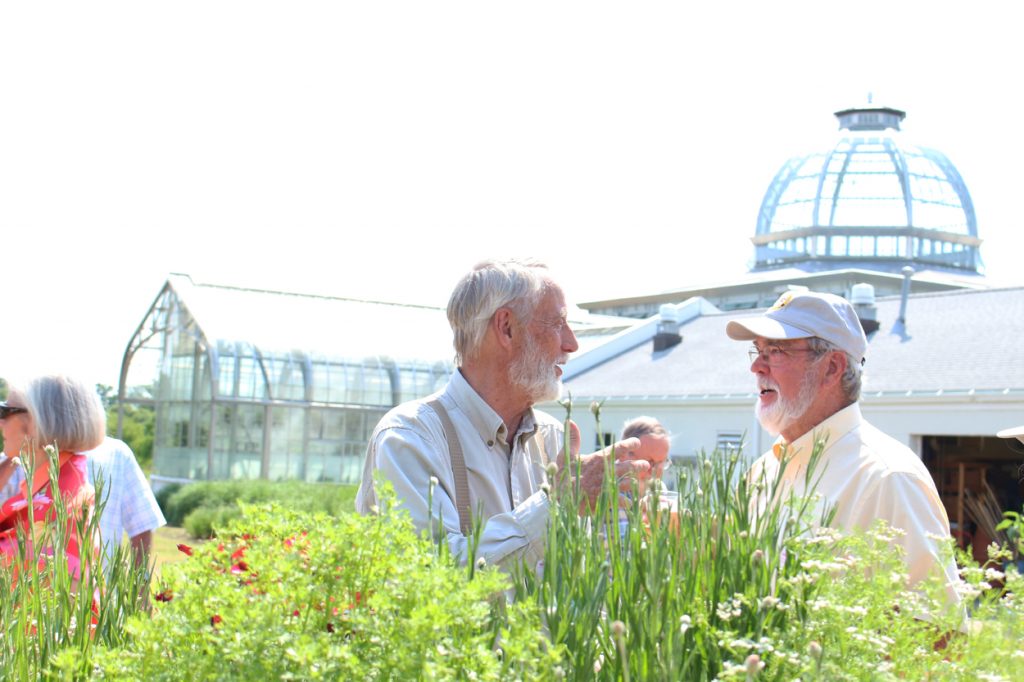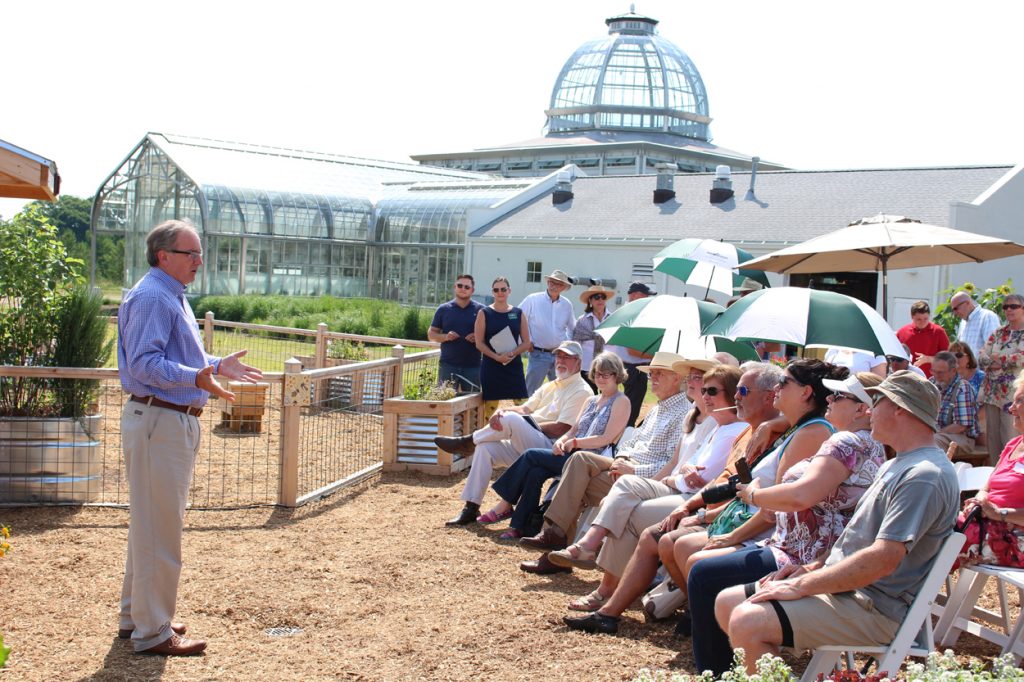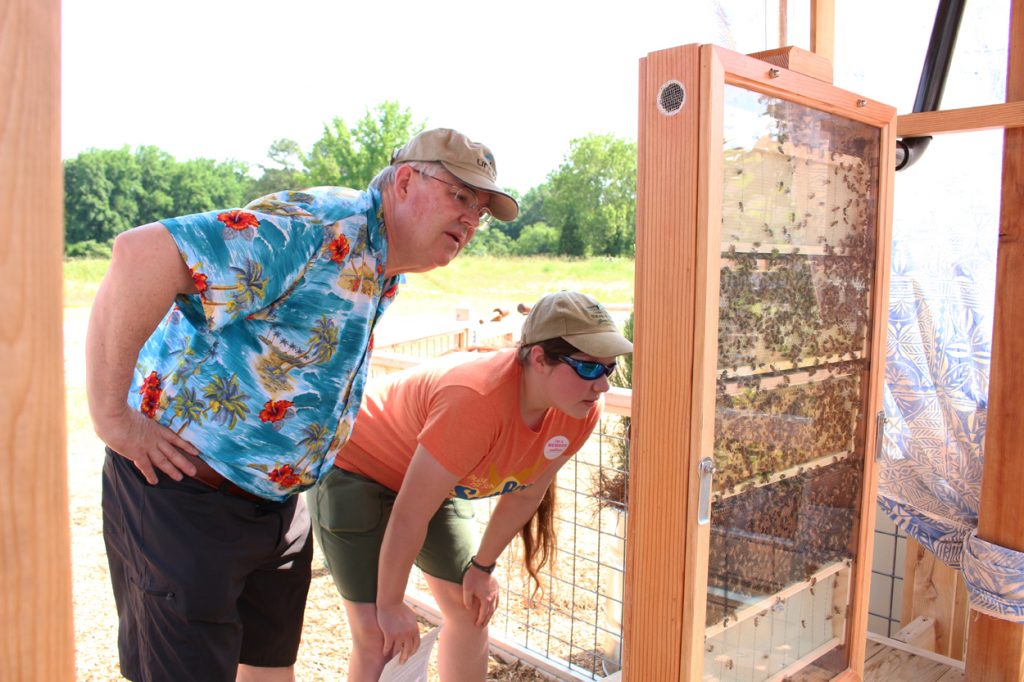Our Apiary is for Beelovers
A new apiary is open for visitors to learn about bees.
The Bob Stapleton & Keith Tignor Apiary, adjacent to the Community Kitchen Garden, will definitely add some sweetness to your visit at Lewis Ginter Botanical Garden this summer.
The apiary will feature a 10-frame observation hive, traditional Langstroth-style hives, and a top-bar hive, which, by its design, is wheelchair friendly — enclosed by a hexagon-shape fence, modeled after a honeycomb cell. Our staff and a dedicated team of volunteers, along with beekeeping students have been working diligently since last fall to create this home-sweet home for our bee friends. Designed and hand-built by this team, the apiary is the sweet fruit of our labor and we are really proud to share it with you.

The dedicated team behind the Bob Stapleton & Keith Tignor Apiary. From left to right: staff Grace Chapman Elton, Elise Benhase, George Cowart, Kelly Riley, Randee Humphrey, volunteer Al Blencowe and Kristi Orcutt.
Earlier this spring, Kristi Orcutt, Children’s Garden educator and resident beekeeper, picked up three nucleus bee colonies from James Hicks, a long-time beekeeper and retired Virginia Tech professor. Our goal is to share the wonder of bees with our visitors and educate people of all ages about the importance of bees and pollination. The apiary has the added benefit of keeping the Community Kitchen Garden full of pollinators for our vegetables. We even harvest the honey from the apiary to sell in the Garden Shop and in the future we hope to host honey harvesting demonstrations too.
The Apiary is named to honor Bob Stapleton and Keith Tignor
The apiary is named in honor of two very special people — Bob Stapleton, president of Richmond Beekeepers Association, and Keith Tignor, state apiarist and honey judge. Both Stapleton and Tignor are dedicated advocates for the preservation of the art and science of beekeeping. “They are well-known within the beekeeper community,” said Executive Director Shane Tippett. “It’s very possible that every beekeeper in Richmond has been touched by either Bob or Keith.” Our apiary, made possible by the generosity of Kenneth and Shirley Walker, is dedicated to their relentless effort.

Bob Stapleton (right) is a long-time beekeeper. Once you get to know him, you’ll see how passionate he is about bees. He is an inspiring person who likes to share his insights with other beekeepers. Also pictured is John Adams, an organic beekeeping advocate.
At the dedication and opening ceremony of the apiary last week, Stapleton and Tignor were surprised to find out that the apiary had been named in their honor. Tignor spoke about the importance of bees, mentioning that they contribute nearly $20 billion to our food supply by pollinating many of the fruits and vegetables consumed in the United States each year. He says he appreciates the Garden’s effort in educating the community about bees. “[The apiary] is a prime example of how we can interact with nature,” he said. “[Bees] give us a sweet taste of nature and provide great educational materials.”

Keith Tignor spoke at the Apiary’s dedication ceremony about the importance of bees. He believes our apiary will be instrumental in educating the community about the art and science of beekeeping.
Watching bees going about their business is an eye-opening experience.
I have learned so many things from observing these honey bees, from the virtue of hard work and collectivity to the power of communications and connectedness. Did you know that worker bees work up to twelve hours per day, sometimes even more in the summer? That’s much more than most of us humans!
The observation hive will be instrumental in educating our visitors, especially the curious wide-eyed little ones, about a day in the life of a bee colony (really, bees are such social creatures that I always think of the whole colony as one living organism). You can see them bringing in the pollen and nectar. Grace Chapman Elton, our horticulture director, shares that her favorite part about beekeeping is not as much about honey harvesting as watching them gather pollen and guessing which flowers the pollen may have come from. You can admire their social organization as they care for their queen and feed her with royal jelly throughout her larval period. If you visit the Garden quite often, you can also take some time-lapse photos and admire the bees’ progress in building honeycombs. I am myself fascinated by their “craftwomanship” and how wisely engineered the honeycomb is.
What’s more? You can observe the worker bees as they do the carefully-choreographed waggle dances, signaling to each other where to find the best nectar. The honey bee dance is part of bee language and an intriguing animal behavior: it’s the intricate vibration that keeps hives organized and running efficiently. To bee or not to bee, it’s all about the dance. When you are finished watching the bee dance at the Apiary, be sure to go do the bee dance painted on the pathway in the Children’s Garden too!

Visitors will have a wonderful time watching bees going about their business. Try looking for the queen and watch the bees do the “waggle” dance.
I’m sure the bees are going to love it here. We provide them with 50-acres of bountiful garden to roam and they will help us educate the community about food security, pollination and sustainable food production methods. Plus, as they gather nectar from our own Garden, I like to think of them as artists who distill all the goodness here and deliver us the unique taste of Lewis Ginter Botanical Garden.
Bees glue everything together.
“Bees glue everything together,” said Orcutt. While she was specifically referring to bees efficiency in constructing their hives, in some sense, her statement can be a metaphor for the community that bees help build. In one of our conversations, she shared with me that if you come to a beekeeper gathering, you can find all kinds of people there. From urban millennials advocating for sustainability, to retired gardeners looking for a new hobby. Each puts aside their differences to come together, talking about bees and sharing their experiences. Most importantly, these bee enthusiasts join hands to raise awareness about bee preservation. Our apiary is one example, among many, of this preservation and education effort. It’s a great example of how we can live in harmony with other creatures: we are dependent on the bees as much as they are dependent on us. We work together so that anyone from toddlers to school children to Master Gardeners can learn about their remarkable ways, and they in turn give us all the fruit that is the wonderful goodness of a healthy ecosystem.